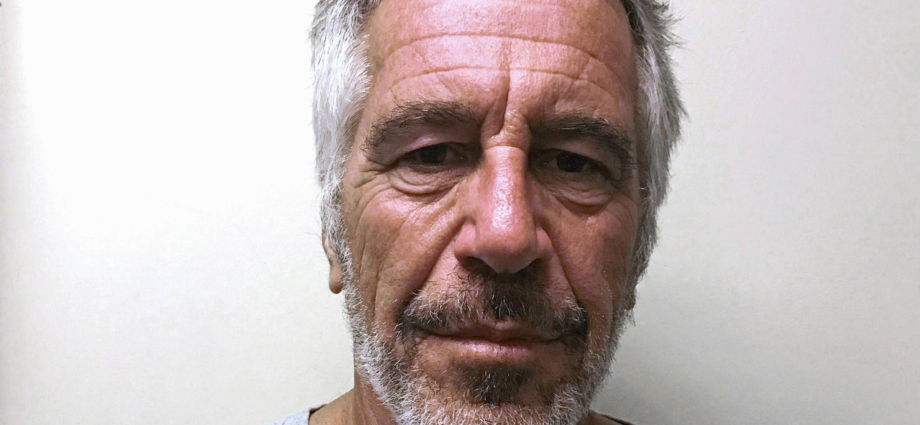It’s like a billboard for disillusionment and mistrust, and it’s everywhere: “Epstein didn’t kill himself.” The phrase has been slapped on beer cans, printed on sweatshirts, blurted as a nonsequitur in cable news interviews, scrawled on posters held up at Southern college football games and on San Francisco bar bathroom walls cramped with Sharpied phone numbers and profanity. It’s been not-so-secretly spelled out in the impeachment-related tweets of Representative Paul Gosar. (You may remember him as the guy who couldn’t get an endorsement from his own siblings while running for office. This week, he’s the guy whose last 23 posts are a paranoid acrostic.) It’s become a joke on dating apps, and it’s been an incessant talking point for social media users left, right, and slantways.
See, despite its popularity among staunch Trump supporters like Gosar, the “Epstein didn’t kill himself” meme, while political, isn’t actually partisan.
Millionaire sex offender Jeffrey Epstein died in jail in August while waiting to be tried for trafficking minors. Epstein had been facing allegations of sex trafficking and sexual abuse of dozens of girls, some as young as 14, for over a decade. In 2008, he served 13 months in jail after pleading guilty to soliciting sex from a minor. He consorted with many powerful men, including presidents Trump and Clinton, and his likely conviction was poised to be the #MeToo movement’s biggest public victory since Harvey Weinstein or Larry Nassar. Then, while the guards outside his door slept, he suffered fatal injuries to his neck that New York City’s chief medical examiner, Barbara Samson, ruled suicide.
As soon as news of Epstein’s death broke, people were suspicious. Trump suggested Epstein was killed for having dirt on Clinton. New York City mayor Bill DiBlasio and Democratic representative Al Green expressed doubts as well. The equal-but-opposite #TrumpBodyCount and #ClintonBodyCount both trended on Twitter. “Even mainstream journalists were teasing that he had been murdered, teasing the conspiracy,” says Joseph Uscinski, a political scientist at the University of Miami and author of American Conspiracy Theories. Samson’s ruling quieted most, but Fox News reignited the theorizing after airing an interview with forensic pathologist Michael Baden, who alleged that Epstein’s death was a homicide. For many on social media, including alpha-bro podcaster Joe Rogan, the fact that Baden was being paid by the Epstein family didn’t matter. “Epstein didn’t kill himself” became a meme, helped along by another Fox News segment in which a former Navy SEAL closed out an interview about military dogs with the phrase, apropos of nothing.
Nobody’s saying Epstein’s death isn’t weird. In fact, it’s because it’s so weird that its become a widespread meme in the way other Trump-era conspiracy theories (like Pizzagate) have not. According to a Rasmussen poll, less than a third of Americans believe that Epstein committed suicide. True information vacuums, events that happen without witnesses, invite conspiracy theorizing. Recall flight Malaysian Airlines flight 370, which disappeared without a trace due to, depending on which kind of truther you ask, the Russians, a blackhole, or a portal to another dimension. Often, the theory is niche, predicated on a particular worldview: When Supreme Court Justice Antonin Scalia died of natural causes in 2016, some speculated that Barack Obama (or Star Trek actor Leonard Nimoy) had him killed for political gain. The Epstein conspiracy theory is different, though. “It’s one of those theories where all you really have to agree on is that Epstein was murdered,” Uscinski says.
The conspiracy theory Epstein’s most resembles is probably the speculation surrounding the assassination of President John F. Kennedy. “Kennedy conspiracy theories reach high numbers, but when you ask adherents who did it, all of a sudden the theories splinter widely—Castro, the Soviets, the military,” Uscinski says. “Once you dig deeper [into the Epstein conspiracy theory], we’re looking at the sum of many different theories bound together.” No matter who they think did it—the Clintons, some cabal of sex trafficking elites, the deep state, Trump—Epstein truthers managed to distill the bit they agreed on into an accessible, shareable catchphrase. Leaving it at “Epstein didn’t kill himself” allows every skeptic to choose their own adventure while still being able to participate in the meme.
If the Epstein memes mean anything, it’s that the American public is deeply suspicious of the closed rooms and dark fringes that seem to encircle and control their world. The details of Epstein’s death, alone in a camera-less room guarded by two unconscious men, are permanently, astonishingly unknowable. Sick of staring into the void, people attempt to fill it with Holmesian deductions, then wild theories, and then, finally, blithely bizarre jokes.
More Great WIRED Stories

